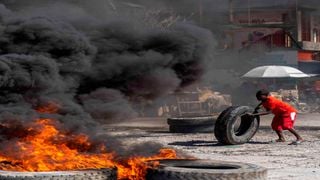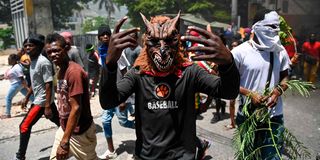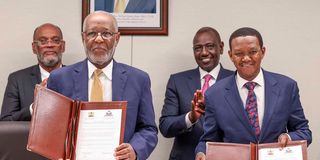
Residents protest the killing of six police officers by armed gangs in Port-au-Prince, Haiti, on January 26. The officers died in the town of Liancourt on January 25 after a fierce battle with gunmen who had tried to take over a police station.
| Richard Pierrin| AFPNews
Premium
Haiti Mission: Kenya has massive support despite criticism, says CS Alfred Mutua
Kenya says its controversial mission to Haiti, in which 1000 police officers are to be sent to quell gang violence, has massive support in spite of mounting criticism.
Foreign and Diaspora Affairs Cabinet Secretary Alfred Mutua says Kenya has already had to do groundwork, including a reconnaissance to understand the terrain the officers will be working in.
But Dr Mutua hit back at claims that the mission was a dangerous trip for Kenyan officers.

A man holds a tree branch and marches by burning tires during a protest against insecurity, on August 7, 2023.
"We are currently working with other partners to get a mandate from the United Nations. We will then hold meetings to garner support for the necessary deployment," Dr Mutua said in Nairobi, referring to the UN Security Council resolution needed to give the mission legal backing. The resolution has been drafted by the US and co-sponsored by Ecuador but needs the approval of the 15-member council.
But the mission, known as Multinational Security Support (MSS), has faced a barrage of criticism, including that Kenya is just as needy as Haiti when it comes to policing, and that the officers will also face a language barrier. Dr Mutua said a reconnaissance team had conducted a quick local survey in which "80 per cent of the people" supported the MSS. He said the officers would also be given a crash course in French, Haiti's official language. However, the majority of Haitians speak local Creole, a mixture of French and other languages.
According to Dr Mutua, ten other countries have so far agreed to send troops to Haiti or to fund the mission. They include Canada and the US, which will provide training facilities, while Jamaica, Antigua and Barbuda and the Bahamas have also pledged personnel for the mission.
They will be tasked with providing operational support to the Haitian police against gangs, guarding key installations and roads, and training the Haitian police.
"We expect that within a few months, say three or four months, we will be in Haiti helping our brothers and sisters. By January at the latest, we will be able to send our 1,000 troops to Haiti to help in the peace mission and the rebuilding of their country," he said on Thursday at a regular press briefing on Kenya's foreign engagements.
Later, in an interview with the BBC, Dr Mutua said the Haitian gangs were dangerous because they hadn't met their match.
"This is a force that has to go in and disarm the thugs, the gangs... free the people who have been kidnapped, free the women who are being raped. But we don't think there will be a lot of violence because these gangs are powerful because they have no one to take them on.
"They don't have the support of the people. People are saying enough is enough."
Kenya, however, faces questions, including the fact that Haiti's previous five foreign missions have failed to bring peace.
Celebrated as the first black-majority country to defeat slave traders and colonialists in the 18th century, its history has been marred by coups, presidential assassinations and rabid criminal gangs. The last president to be assassinated was Juvenal Moïse, who was shot dead in his palace in Port au Prince in July 2021.

A man wears a werewolf mask during a protest against insecurity, on August 7, 2023, near the Prime Minister’s official house in Port-au-Prince, Haiti. Some 300 women and minors were kidnapped in Haiti by criminal gangs in the first half of this year.
The MSS has already been endorsed by the Caribbean Community (CARICOM), the regional bloc to which Haiti belongs, adding to its legitimacy. In fact, the mission was first proposed by Haitian Prime Minister Ariel Henry, who said he needed to secure the country's key installations and prepare for elections.

President William Ruto (back right) and Haiti Prime Minister Ariel Henry (back left) witnessing the signing of an agreement at the Kenyan Mission in New York, United States.
Last week, President William Ruto said the world had let Haiti down after failing to end the chaos there.
"Haiti deserves better from the world. The cry of our brothers and sisters who were the first to win their struggle for freedom from colonial tyranny has reached our ears and touched our hearts," he told the UN General Assembly on Thursday.
"Doing nothing in the face of the historic isolation, neglect and betrayal of the Haitian people is out of the question."
Locals still have a bitter taste in their mouths from previous missions. David Abdulah, a member of the regional executive committee of the People's Assembly of the Caribbean, says Haiti's painful experience of foreign military intervention means the MSS could make the crisis worse.
"It is clear to us that Kenya is being promoted as a proxy because the core group countries - the US, Canada and France - realise that the resentment in Haiti against their military intervention would be immense," he wrote in an open letter to CARICOM on September 5 on behalf of the Assembly.
"We must recognise the social dynamics of Haitian society and the fact that there is an elite that wields significant power. Henry, and any successor to him, installed through an electoral process that is neither free nor fair, will simply enable the elites to maintain their hold on power - much to the satisfaction of the Core Group."
Kenya has yet to spell out the direct benefits of the mission, but Foreign Affairs and Diaspora Cabinet Secretary Alfred Mutua argued on Friday that "the eventual stability and prosperity of Haiti would not only benefit its neighbours and the region but would also be a force for good for the global peace and security architecture.
It will take money. US Secretary of State Antony Blinken told the same meeting in New York on Friday that the US government would provide $100 million in direct support to the MSS if approved by Congress. The US has already asked its citizens to leave Haiti.

President William Ruto and Haiti Prime Minister Ariel Henry in New York, United States.
"And our Department of Defence is prepared to provide robust support - including planning assistance, intelligence support, airlift, communications and medical support," Blinken said, but called on other donors to join.
When CARICOM first endorsed the MSS in July, protests against the deployment erupted in Haiti. On Friday, gangs in Haiti that have blocked access to ports in the past called for Henry's removal.
The MSS has been opposed by black lobbies in the US.
The Black Alliance for Peace (BAP), a rights lobby against what it calls imperialism, said Kenya's proposal amounted to "foreign armed intervention in Haiti".
Additional reporting by Aggrey Mutambo





